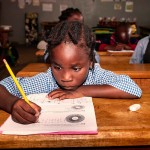Father Peter Hillen SAC
Africans Must Missionize Themselves
Since 1974, he has been a Pallottine, and since 1979, a priest. Father Peter Hillen has dedicated 32 years to serving people in Africa, with the last 10 years spent in Nigeria. He is especially committed to formation, the training of priests and brothers. Father Hillen has guided around 85 brothers (40 in Cameroon) as postulant master, many of whom today serve as Pallottine priests or brothers, diocesan priests, or in other communities. He currently lives and works at Pallotti House in Mbauwku-Anambra, where many benefactors in Germany and Austria have maintained close contact, supporting his tireless work on development projects.
Thank you for taking some time to speak with us. You are a man of mission. What topics would you like to discuss today?
That depends on what the readers are interested in. I can share my experiences in Africa. I have primarily served in three countries: Cameroon (since 1985), South Africa (since 1999), and now Nigeria (since 2007).
What project are you currently working on?
I came to Nigeria as a tourist in 2007, worked in a parish for 15 months, and learned Igbo. We received land from the local king and have since built a house for the community. Today, we are 14 priests, and we have 26 students. Currently, I am, for example, overseeing our water factory. Through our own work, we are able to generate income for our growing community. Providing clean, affordable water in bags is also a great help for the people.
Water is life. Shouldn’t water be freely available to all?
Yes, it should be. We have already built 10 wells, with four more in planning. We also installed several rainwater catchment tanks to provide water during the dry season. In the area where we sell water, previous well-drilling attempts failed due to sandy soil and deep groundwater. Therefore, there isn’t enough local water, and people must buy from companies. We joined in to help. A pack of 20 water bags, each holding 0.6 liters, costs 100 Naira (about 340 Naira is one euro). It’s affordable and helps both the people and us, especially as drinking water is scarce in Nigeria’s heat.
How are people in Nigeria doing?
The country faces many challenges, some of which regularly make headlines in Germany. Unemployment is high, even for qualified university graduates. This leads young adults to look overseas for better opportunities. Members of the Igbo tribe are known for their business acumen and are active in trade worldwide. There’s a saying: ‘Gather all Igbo people, and you have all the world’s languages.’ The Igbo invest a lot in the future, particularly here in southeastern Nigeria, a region Europeans remember as ‘Biafra.’ This area endured a devastating civil war, seen by locals as a fight for independence due to neglect from the central government. The central government thought the uprising would last three months, but it took three years. They blamed missionaries for prolonging the conflict due to international support. After the war, all church-run schools were taken over by the state. Recently, churches — mainly Catholic and Anglican — have regained around 400 schools, which is both a responsibility and a sign of trust in the churches.
Boko Haram means ‘Western education is a sin’ — is that also an issue for the Islamists in the north?
The Igbo invest in development, bringing education and growing prosperity. The Islamists disapprove of this and prefer to keep the population uneducated. Western prosperity also unsettles Boko Haram. Biafra Day regularly stirs tensions between North and South, between Muslims and Christians. Boko Haram exploits this by inciting chaos, indifferent to whether they kill Muslims or Christians.
The churches in Africa are thriving; churches are full, parishioners are active, there is no so-called shortage of priests, and religious orders are flourishing?
Yes, Sunday Mass is genuinely important for all Catholics in Nigeria, quite different from the majority in Europe. Young people meet in youth groups and attend confession monthly. Our Pallotti Youth group has chosen the motto ‘Pallotti for Action – Action for Christ.’ There are many Catholics in our region. Church, family, and community are highly valued. Sometimes I think the faithful are ‘more Catholic than the Pope.’ In Africa, people are deeply rooted in faith, a tradition that goes back generations. This also fosters sects, charismatic movements, and a yearning for miracles and healings. But we also have Marian groups and university groups where Catholic students gather.
Regarding the call to become a priest, Nigeria likely has the strongest vocations in the global church. Seminaries are full, and not all can be accepted. In the Diocese of Awka, where I serve, we have about 500 priests, around 120 of whom are on mission for three years, for example, in South Africa, Chad, or Mali. Some are also serving in Germany and Austria.
Is Europe doing something wrong, or has enlightenment simply not reached Nigeria yet?
It’s not that simple! When I first came to Africa three decades ago, churches in Europe were still full, despite the Enlightenment. Developments in my home country truly concern me, though I don’t have answers or solutions. One cause may be the distractions and opportunities available in Germany that are absent in Nigeria — technology, television, smartphones, and commercial activities. Life in industrial societies is organized differently. When young people come to church here, there’s often no competing activity.
Another reason might be that traditional religions in some ways align closely with Catholicism. There was a strong societal role for priests, as well as similar views on the role of women or the understanding of Mary. Africans have always been deeply religious. I encourage people to question rituals and daily life, raising topics like ecumenism or, practically, ‘Can a Catholic marry an Anglican?’ or the role of women. In Nigeria, women traditionally don’t have their own religion; the husband determines it. So, in mixed marriages, what does that mean? These are daily issues, along with similar interests as in Europe — soccer, social media, or the German Bundesliga! We have a magazine, The Pallottine, published three times a year, where we cover topics of interest to the faithful.
The German Bundesliga, really?
Yes, many young people are very interested and relatively well-informed.
Returning to the original question: how does the Church reach believers and non-believers?
The Church must go to the people and to the margins. For example, I go where the action is and mingle, even at soccer matches, which is unconventional in Nigeria. But being present and approachable has earned me the trust of the people. It’s essential that we allow people to experience the Church differently.
With the end of colonialism and since the Second Vatican Council, the meaning of missionary work has changed greatly. Is there still a need for missionaries?
The Church is missionary by nature, or it is not! ‘Go into all the world and preach the Gospel to all creation’ (Mark 16:15); Jesus’ command still applies. Our Church must carry its message and commitment to the ends of the earth.
Why?
To fulfill His command. And to free people from their ‘heathen fears.’ ‘I won’t go to that village, or I’ll be cursed!’ We must bring God’s mercy and the Good News to the people. We cannot withhold our God, who unconditionally accepts and loves everyone.
I am grateful and glad to have been involved in the training of brothers. Today, we have local vocations, and Pallottine spirituality lives on. Africans must missionize themselves, with their diverse regional traditions and tribal cultures playing an important role. Unity in diversity. Each region must set its own focus. Nigeria will develop differently than Cameroon or South Africa.
What role does Pallottine spirituality play?
We Pallottines live among the people and are there for them; that’s the most important thing. We adapt to each culture, make the people’s questions our own, and, as Christians, seek answers. The Church must not be distant; it must be close to the people. We don’t change structures overnight. Sometimes there are rules that cannot change immediately and that stifle questions. We need the freedom of God’s children. We must search for answers with the people. The Church must be alive and present for everyone — not an institution or power structure, but a Church of the poor.
Vincent Pallotti said cooperation is the most divine of all gifts. The cooperation of all Christians, the so-called lay apostolate, is distinctively Pallottine. It should make clear what it means to be created in God’s image and that we all share responsibility for one another and the world. We Pallottines encourage people to pass on this vision. This applies to both Europe and Africa. The Nigerian Church is often still closed off and not close enough to the people. ‘The shepherd must smell like the sheep!’ says Pope Francis. This is the right path.
Das könnte Sie auch interessieren











